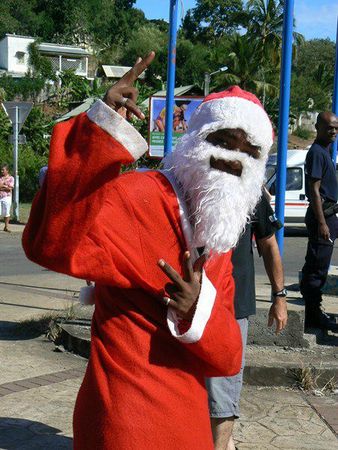Population Study episode 2 : Mognés
Mogné means "sir" in Mahorese. The men here don't have the most important role to play. They don't own the houses, they don't get much of a say in what goes on in the house. However, they do get to do some things that the women aren't allowed to.
All the religious side of things in Mayotte - a Muslim country - is held by the men. The cadi of each village, the main village chief if you like, is always a man. He's the one people have to go to get married or to hold any event in the village. Chief of them all is the Grand Cadi, who has the main religious and administrative power in Mayotte. The others are sheik, mufti, sharif, imam and muezzin. The Grand Cadi decides when the Ramadan starts and ends, when the religious bank holidays are and many other such things, all by looking at the moon. For example, it's Ramadan at the moment, "tsumu" in Mahorese. Ramadan is planned to finish on the 19th of August, assuming the Grand Cadi sees the moon on that night. If, however, the Grand Cadi does not see the moon that night, Ramadan will finish on the 20th. As the end of Ramadan is a big Muslim bank holiday, the Aïd-el-Fitr, this uncertainty messes up all offices, schools, shops, restaurants and other public places as they don't know until the last minute which day they will be closed. Last year, the Aïd-el-Fitr was meant to fall on a Tuesday. Everybody knew this and therefore planned to close on that Tuesday. We told the kids not to come into school that day as it would be closed. Monday evening at seven-ish, the Grand Cadi announced that he hadn't seen the moon and that the Aïd-el-Fitr would therefore be on Wednesday. In the end, the shops closed for two days instead of one, the schools had half of their usual ration of kids over both days. This also means that at the last minute, people can be told they have another day of fasting to go through.
In each village, there's a fundi. Fundi literally means "he who knows". They're masters of a particular craft, anything from metalwork or carpentry to football. They're also the masters in the Coranic schools. These Coranic schools are the Muslim equivalent of Sunday schools, but they work the kids much harder. Children go to Coranic school once or twice a day, generally for periods of two hours, sometimes both before and after regular school. Which means very tired kids. They sit in a huddle round the fundi, who chants verses from the Coran for them to repeat back. They also practise writing in Arabic, using a coconut-tree leaf as a pen, charcoal mixed with water as ink and a plank of wood for paper. Often, as they don't study Arabic until they're in their mid-teens, they don't understand a word they're saying. Some choose to study Arabic later on to try and understand the Coran, others are completely disgusted of the whole thing by the time they're old enough for lessons. When they come to school after having spent a couple of hours at Coranic school, it's sometimes hard work for them to write the other way round. Fundis are generally men.

The men's dance is chigoma, which they dance by shuffling forward in a long line with a long scarf in their hands. They're very smart when they do this dance - so smart that in fact, if you see a Mahorese man wearing a suit and tie, you can be pretty sure he'll be dancing chigoma at some point in the very near future. They have another dance, too : m'rengué. This is a fighting dance, practised only at night and exclusively male. Drums sound all night without stopping. Meanwhile, two men come forward and parade in a circle. They then take their shirts off and throw themselves at each other in a bare-handed wrestling match. The only rule is that they are not to hit each other below the belt. During this dance, similar to Brazilian capoeira, they must defend their honour in front of the watching girls, but each man is also fighting to prove the worth of his native village. Judges take the fighting men apart if either starts to bleed, so there are rarely any accidents.
Men have three gender-specific items of clothing, and most wear at least one of the three. The most common is the kofia, the hat with small holes which the men wear to go to Mosque. It can be hand-embroidered or just printed. The embroidered ones are generally made by a woman who is very close to the man, such as his wife or fiancée, and can take several months. Then there is the shikoyi, a square of material they tie round their waists, and finally, the other most common, the kandzu, a long white dress they wear to go to Mosque or ceremonies such as funerals and weddings. Traditionally, some also wear a sort of ankle-length skirt made out of a sisal-woven rice sack.
And finally, there's Father Christmas.




/https%3A%2F%2Fstorage.canalblog.com%2F74%2F16%2F886305%2F104399341_o.jpg)
/https%3A%2F%2Fstorage.canalblog.com%2F46%2F39%2F886305%2F105228464_o.jpg)
/https%3A%2F%2Fstorage.canalblog.com%2F48%2F20%2F886305%2F105197145_o.png)
/https%3A%2F%2Fstorage.canalblog.com%2F13%2F05%2F886305%2F104861776_o.jpg)
/https%3A%2F%2Fstorage.canalblog.com%2F34%2F27%2F886305%2F69902683_o.jpg)
/https%3A%2F%2Fstorage.canalblog.com%2F60%2F68%2F886305%2F69902677_o.jpg)
/https%3A%2F%2Fstorage.canalblog.com%2F88%2F49%2F886305%2F69902659_o.jpg)
/https%3A%2F%2Fstorage.canalblog.com%2F98%2F60%2F886305%2F69896713_o.jpg)
/https%3A%2F%2Fstorage.canalblog.com%2F53%2F34%2F886305%2F69883693_o.jpg)